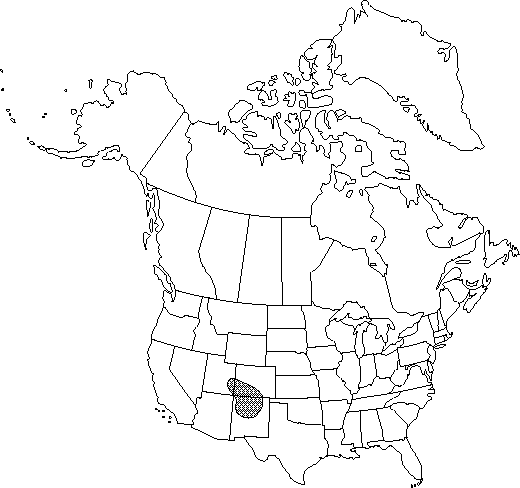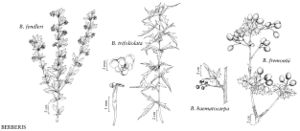FNA>Volume Importer |
imported>Volume Importer |
| (7 intermediate revisions by 2 users not shown) |
| Line 8: |
Line 8: |
| | }} | | }} |
| | |special_status={{Treatment/ID/Special_status | | |special_status={{Treatment/ID/Special_status |
| | + | |code=E |
| | + | |label=Endemic |
| | + | }}{{Treatment/ID/Special_status |
| | |code=F | | |code=F |
| − | |label=Selected by author to be illustrated | + | |label=Illustrated |
| | }} | | }} |
| | |basionyms= | | |basionyms= |
| Line 20: |
Line 23: |
| | }}<!-- | | }}<!-- |
| | | | |
| − | --><span class="statement" id="st-d0_s0" data-properties="shrub duration;shrub some measurement"><b>Shrubs,</b> deciduous, 1-2 m.</span> <span class="statement" id="st-d0_s1" data-properties="stem growth form;primary and axillary shoot shape;primary and axillary shoot height or length or size"><b>Stems </b>dimorphic, with elongate primary and short axillary shoots.</span> <span class="statement" id="st-d0_s2" data-properties="bark coloration or density;bark pubescence"><b>Bark </b>of 2d-year stems purple, glabrous.</span> <span class="statement" id="st-d0_s3" data-properties="bud-scale distance;bud-scale duration"><b>Bud-</b>scales 1-2 mm, deciduous.</span> <span class="statement" id="st-d0_s4" data-properties="spine presence;spine architecture;spine architecture"><b>Spines </b>present, simple or 1-2-pinnately branched.</span> <span class="statement" id="st-d0_s5" data-properties="leaf architecture"><b>Leaves </b>simple;</span> <span class="statement" id="st-d0_s6" data-properties="petiole some measurement">petioles 0.2-0.7 cm.</span> <span class="statement" id="st-d0_s7" data-properties="leaf-blade arrangement or shape;leaf-blade architecture;leaf-blade length;leaf-blade width;leaf-blade fragility;base width;base shape;margin shape;margin shape;margin shape;margin architecture;tooth quantity;tooth height;bristle length;bristle width;apex shape;apex shape;apex shape;apex shape"><b>Leaf-</b>blade narrowly elliptic, 1-veined from base, 1.7-4.6 × 0.6-1.7 cm, thin and flexible, base long-attenuate, margins plane, entire or toothed, each with 3-12 teeth 0-1 mm high tipped with bristles to 0.4-1.4 × 0.1-0.2 mm, apex acute to obtuse or rounded;</span> <span class="statement" id="st-d0_s8" data-properties="surface reflectance;surface reflectance;surface architecture or pubescence or relief;surface reflectance;surface reflectance;surface pubescence">surfaces abaxially dull or glossy and smooth, adaxially dull or glossy and not glaucous.</span> <span class="statement" id="st-d0_s9" data-properties="inflorescence arrangement;inflorescence architecture or arrangement;inflorescence architecture;inflorescence some measurement"><b>Inflorescences </b>racemose, lax, 4-15-flowered, 1.5-4.5 cm;</span> <span class="statement" id="st-d0_s10" data-properties="bracteole texture;apex shape">bracteoles membranous, apex acuminate.</span> <span class="statement" id="st-d0_s11" data-properties="lateral tooth orientation"><b>Flowers:</b> anther-filaments without distal pair of recurved lateral teeth.</span> <span class="statement" id="st-d0_s12" data-properties="berry coloration;berry pubescence;berry shape;berry some measurement;berry texture;berry architecture"><b>Berries </b>red, not glaucous, oblong-ellipsoid, 6-8 mm, juicy, solid.</span><!-- | + | --><span class="statement" id="st-undefined" data-properties=""><b>Shrubs,</b> deciduous, 1-2 m. <b>Stems</b> dimorphic, with elongate primary and short axillary shoots. <b>Bark</b> of 2d-year stems purple, glabrous. <b>Bud</b> scales 1-2 mm, deciduous. <b>Spines</b> present, simple or 1-2-pinnately branched. <b>Leaves</b> simple; petioles 0.2-0.7 cm. <b>Leaf</b> blade narrowly elliptic, 1-veined from base, 1.7-4.6 × 0.6-1.7 cm, thin and flexible, base long-attenuate, margins plane, entire or toothed, each with 3-12 teeth 0-1 mm high tipped with bristles to 0.4-1.4 × 0.1-0.2 mm, apex acute to obtuse or rounded; surfaces abaxially dull or glossy and smooth, adaxially dull or glossy and not glaucous. <b>Inflorescences</b> racemose, lax, 4-15-flowered, 1.5-4.5 cm; bracteoles membranous, apex acuminate. <b>Flowers</b>: anther filaments without distal pair of recurved lateral teeth. <b>Berries</b> red, not glaucous, oblong-ellipsoid, 6-8 mm, juicy, solid.</span><!-- |
| | | | |
| | -->{{Treatment/Body | | -->{{Treatment/Body |
| Line 27: |
Line 30: |
| | |elevation=1300-2700 m | | |elevation=1300-2700 m |
| | |distribution=Colo.;N.Mex.;Utah. | | |distribution=Colo.;N.Mex.;Utah. |
| − | |discussion=<p>Berberis fendleri is susceptible to infection by Puccinia graminis.</p> | + | |discussion=<p><i>Berberis fendleri</i> is susceptible to infection by Puccinia graminis.</p> |
| | |tables= | | |tables= |
| | |references= | | |references= |
| Line 36: |
Line 39: |
| | -->{{#Taxon: | | -->{{#Taxon: |
| | name=Berberis fendleri | | name=Berberis fendleri |
| − | |author=
| |
| | |authority=A. Gray | | |authority=A. Gray |
| | |rank=species | | |rank=species |
| Line 50: |
Line 52: |
| | |publication title=Mem. Amer. Acad. Arts, ser. | | |publication title=Mem. Amer. Acad. Arts, ser. |
| | |publication year=1849 | | |publication year=1849 |
| − | |special status=Selected by author to be illustrated | + | |special status=Endemic;Illustrated |
| − | |source xml=https://jpend@bitbucket.org/aafc-mbb/fna-fine-grained-xml.git/src/287ef3db526bd807d435a3c7423ef2df1e951227/V3/V3_400.xml | + | |source xml=https://bitbucket.org/aafc-mbb/fna-data-curation/src/2e0870ddd59836b60bcf96646a41e87ea5a5943a/coarse_grained_fna_xml/V3/V3_400.xml |
| | |genus=Berberis | | |genus=Berberis |
| | |species=Berberis fendleri | | |species=Berberis fendleri |
| − | |apex shape=acuminate;acute;obtuse or rounded
| |
| − | |bark coloration or density=purple
| |
| − | |bark pubescence=glabrous
| |
| − | |base shape=long-attenuate
| |
| − | |base width=0.6cm;1.7cm
| |
| − | |berry architecture=solid
| |
| − | |berry coloration=red
| |
| − | |berry pubescence=not glaucous
| |
| − | |berry shape=oblong-ellipsoid
| |
| − | |berry some measurement=6mm;8mm
| |
| − | |berry texture=juicy
| |
| − | |bracteole texture=membranous
| |
| − | |bristle length=0.4mm;1.4mm
| |
| − | |bristle width=0.1mm;0.2mm
| |
| − | |bud-scale distance=1mm;2mm
| |
| − | |bud-scale duration=deciduous
| |
| − | |inflorescence architecture=4-15-flowered
| |
| − | |inflorescence architecture or arrangement=lax
| |
| − | |inflorescence arrangement=racemose
| |
| − | |inflorescence some measurement=1.5cm;4.5cm
| |
| − | |lateral tooth orientation=recurved
| |
| − | |leaf architecture=simple
| |
| − | |leaf-blade architecture=1-veined
| |
| − | |leaf-blade arrangement or shape=elliptic
| |
| − | |leaf-blade fragility=pliable
| |
| − | |leaf-blade length=1.7cm;4.6cm
| |
| − | |leaf-blade width=thin
| |
| − | |margin architecture=tipped
| |
| − | |margin shape=toothed;entire;plane
| |
| − | |petiole some measurement=0.2cm;0.7cm
| |
| − | |primary and axillary shoot height or length or size=short
| |
| − | |primary and axillary shoot shape=elongate
| |
| − | |shrub duration=deciduous
| |
| − | |shrub some measurement=1m;2m
| |
| − | |spine architecture=branched;simple
| |
| − | |spine presence=absent
| |
| − | |stem growth form=dimorphic
| |
| − | |surface architecture or pubescence or relief=smooth
| |
| − | |surface pubescence=not glaucous
| |
| − | |surface reflectance=glossy;dull;glossy;dull
| |
| − | |tooth height=0mm;1mm
| |
| − | |tooth quantity=3;12
| |
| | }}<!-- | | }}<!-- |
| | | | |
| | -->[[Category:Treatment]][[Category:Berberis]] | | -->[[Category:Treatment]][[Category:Berberis]] |
Shrubs, deciduous, 1-2 m. Stems dimorphic, with elongate primary and short axillary shoots. Bark of 2d-year stems purple, glabrous. Bud scales 1-2 mm, deciduous. Spines present, simple or 1-2-pinnately branched. Leaves simple; petioles 0.2-0.7 cm. Leaf blade narrowly elliptic, 1-veined from base, 1.7-4.6 × 0.6-1.7 cm, thin and flexible, base long-attenuate, margins plane, entire or toothed, each with 3-12 teeth 0-1 mm high tipped with bristles to 0.4-1.4 × 0.1-0.2 mm, apex acute to obtuse or rounded; surfaces abaxially dull or glossy and smooth, adaxially dull or glossy and not glaucous. Inflorescences racemose, lax, 4-15-flowered, 1.5-4.5 cm; bracteoles membranous, apex acuminate. Flowers: anther filaments without distal pair of recurved lateral teeth. Berries red, not glaucous, oblong-ellipsoid, 6-8 mm, juicy, solid.
Phenology: Flowering spring–summer (May–Aug).
Habitat: Slopes and canyon bottoms
Elevation: 1300-2700 m
Distribution
Colo., N.Mex., Utah.
Discussion
Berberis fendleri is susceptible to infection by Puccinia graminis.
Selected References
None.

